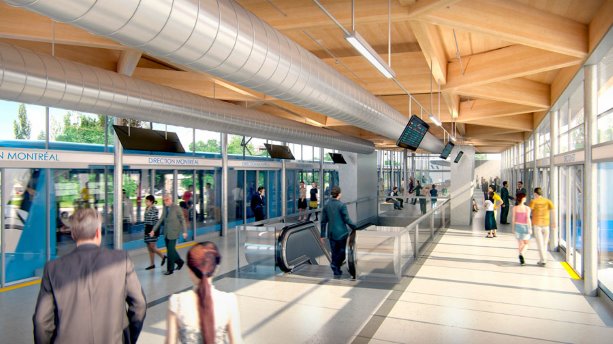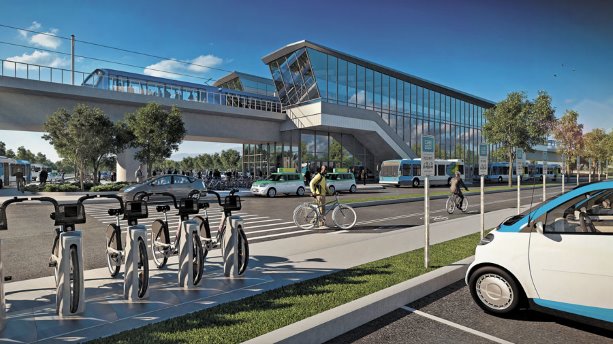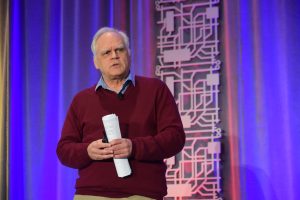Preparatory work for Montreal’s new 27-station, 67-kilometre light rail transit (LRT) project continues at a breathtaking pace as proponents CDPQ Infra say they are keeping to their plan to break ground before the end of 2017, a year after the $5.9-billion build was announced.
The Reseau electrique metropolitain (REM) will link downtown Montreal, the South Shore, the West Island, the North Shore and the airport via a dual-track automated electric LRT system.
CDPQ Infra, the infrastructure subsidiary of Quebec’s Caisse de depot pension fund, was founded in 2015; the REM project was announced last April; preliminary work is expected to start this summer, with work on the system itself projected to begin in the fall; and the first automated trains are expected to be in operation by the end of 2020.
Announcing three new stations added to the system in November, CDPQ Infra updated its pledged commitment to $3.1 billion, and Quebec’s Minister of Transport, Sustainable Mobility and Transport Electrification Laurent Lessard at the same time reaffirmed the province’s commitment to participate in financing for the system.
Jean-Marc Arbaud, CDPQ Infra’s deputy managing director, who is heading up the project, said he was confident the remaining proposed funding partners including the federal government would be in place this summer, permitting the launch of construction.
"We have to keep working hard to be sure that we maintain the schedule and be sure that we are able to start in September," said Arbaud. "Other than that, there are no major obstacles to the project."
The REM is CDPQ Infra’s first major project and will have significant social and economic implications for Montreal, said Arbaud. The owners expect the new network will generate approximately 7,500 direct and indirect jobs annually during the four-year construction phase, and one projection suggests there will be $5 billion in additional investment spinoffs as investors move to create transit-oriented developments in the vicinity of many of the new stations.
Consultants used so far have included Cima+, Hatch Mott MacDonald and Steer Davies Gleave.
There are two procurement streams underway, one for engineering and construction and one for the rolling stock and transit systems contract. Qualified teams seeking the engineering and construction contract are Groupe NouvLR and Kiewit-Eurovia. Groupe NouvLR members include SNC-Lavalin Grands Projets Inc., Dragados Canada Inc., Groupe Aecon Quebec Ltee, Pomerleau Inc., EBC Inc. and Aecom Consultants Inc. Their competitor includes Construction Kiewit Cie, Eurovia Quebec Grands Projets Inc., WSP Canada Inc. and Parsons Inc.
Arbaud said the winning team may be chosen by June.
Three teams qualified for the rolling stock contract including one with Bombardier. Arbaud said the winners would be chosen strictly on merit, ensuring the best possible return for investors.
"We have a strict process and a lot of eyes looking at it," he said. "It is the best proposal. There is clear criteria on how we are going to evaluate them."
As for trades and sectors that will get work, Arbaud said, "The list is long — civil, electrical, steel, construction, rolling stock, industrials, control systems, the usual suspects for such a project."
Arbaud and CDPQ Infra’s media relations director Jean-Vincent Lacroix mentioned several factors accounting for how swiftly the project is moving forward including a management structure that permits quick decisions and a "start-up" mentality, said Lacroix.
"We look at it more on a performance basis, so we are able to develop quickly all the technical specifications," said Arbaud. "We are a very flat organization and we make decisions very quickly and that helps in terms of scheduling."
The process of shopping around for a high-performance infrastructure investment idea got underway soon after CDPQ Infra was founded, said Arbaud. Consulting with government transportation officials was and remains an essential part of the process, he added. From CDPQ Infra’s point of view, a return on investment was the top priority, he said, but economic, social and environmental benefits were also important considerations.
"In the beginning we had the benefit to review all the existing studies as a starting point," said Arbaud. "That was the summer of 2015. And we started to look at what could be our big project."
Environmental assessment hearings were held last year and the major BAPE (Bureau d’audiences publiques sur l’environnement) report on the project is currently in the hands of the provincial environment minister.
"I don’t expect any issues," said Arbaud.
Once completed, the REM will be
the fourth largest automated transportation system in the world. It will operate electrically with no drivers with an initial fleet of 200 cars. Annual ridership projections are for 30.7 million passengers for 2021, jumping to 42.7 million 10 years later.
The project will be fully integrated with Montreal’s existing transportation systems including the orange, green and blue Metro lines and trains from the suburbs.












Recent Comments
comments for this post are closed